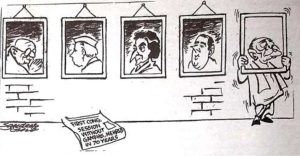
GANDHINAGAR: The Bharatiya Janata Party’s Economic Policy Statement 1992, which was approved by the National Executive here, largely supports the economic reforms of the Rao government but also incorporates sections intended to give the party a pro-poor image.
These sections, which were absent from the draft discussed by the National Executive in Samath in March, have apparently been added under pressure from the party’s mass-based leaders.
The new sections deal with the co-operative and people’s movements and call for a separate developmental banking institution to promote native craftsmanship and develop the unorganized sector. The 31-page policy statement has been prepared by a five-member committee led by K.R. Malkani and will be sent for ratification by the National Council now that it has been approved by the National Executive.
The statement is a carryover of the BJP”s controlled liberalization adequate checks on the multinational companies thrust continues to be on the middle class though attempts have been made to express concern for the poor.
The policy statement describes the economic model being presented as a “humanistic approach to economic development.” The fact that the party is offering an alternative model a Swadeshi alternative is mentioned only parenthetically although it is stated to be the underlying theme of the document.
“I am sure the “humanistic approach to economic development will give the BJP a distinct identity. It will also be the guiding principle for our workers in contacting the masses,” BJP President Murli Manohar Joshi said while placing the document before the meeting.
Tracing its roots to Mahatma Gandhi’s Ram Rajya and Deen Dayal Upadhyay as Integral Humanism, the economic Statement emphasizes that the party’s programs would be guided by humanism and Swadeshi.
This is the party’s first policy statement to emphasize its commitment to Gandhi Ji’s Ram Rajya, The various two documents, of Jayaprakash Narayan. Interestingly, JP, who figured prominently in the earlier two documents, is not mentioned at all in the BJPs latest attempt at forging an economic model.
A comparison with the earlier statements reveals interesting changes. Both the 1980 and 1986 documents did not, by and large, have a focal point, though they did reveal glimpses of some of the major themes of the 1992 document. The slogan of the 1980 policy was Har haath kokaam, har khet ko paani (Work for every hand, water for every field).
But interestingly, though it came soon after the Janata Party experiment and the actions against multinationals like IBM and Coca Cola, the 1980 draft was quite casual in its treatment of the role of multinational companies.
Rajiv Gandhi’s ascent to power and his new economic policy induced the party to go in for a slightly more comprehensive economic statement in 1986, The 1980 slogan was expanded to Har haath kokaam, kaam kasahidaam, jahan ho wahin par kaam (Work for all, adequate compensation for work, and employment at the situation), while coming down heavily on the new economic policy and the “screwdriver technology” that it spelled.
In the 1992 document, the party has, for the first time, tried to give an ideological perspective to its economic thinking.
Among the primary reasons for the delay in doing this was that until 1989, the party was principally concerned with trying to make its presence felt in politics. In 1991 the party won a substantial numbers of seats in Parliament and also came to power in four States.
With power at the Center within sight, the party turned its attention to economic matters and felt the need to prepare a comprehensive — economic document which could also provide guidelines for its State Governments.
Moreover, the Congress with its liberalization policies, first initiated by Rajiv Gandhi and accelerated by Narasimha Rao, had seized the BJPs plank of liberalization. Until then, the BJPs economic thinking had been distinct from that of other parties.
But with the Congress upstaging it, the BJP had to again emphasize its distinctiveness. The new economic policy statement with its emphasis on the RSS theme of Swadeshi is an attempt.
Article extracted from this publication >> May 15, 1992